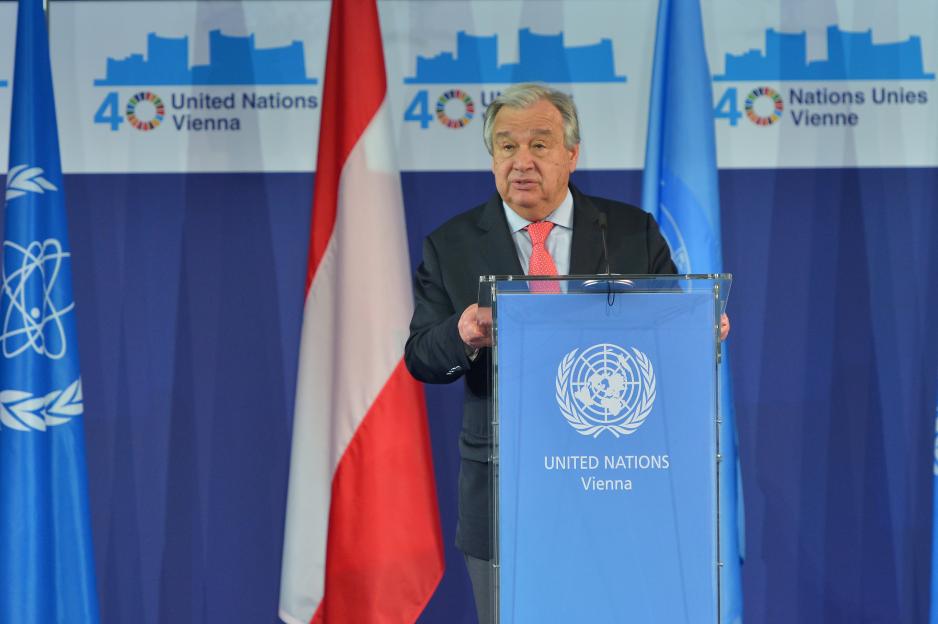Solidarity in Times of Crisis

UN Secretary General Antonio Guterres. Photo: IAEA Image Bank
Commentary: Earlier this week, a Mexican governor launched the theory that poor people are immune to the Corona virus. «The majority of those infected are wealthy people», he explained. The theory is, of course, absurd. And because it is so absurd, perhaps there will eventually be a crisis package aimed at those at the lower end of the table too?
Solidarity is tested when the international society is governed by State of Emergency medical and economic rules. We take care of our own when a crisis looms.
Moral fingers are lifted then. From the laptop keyboard at the home office, in order to avoid spreading infection, moral fingers are pointed at our new victims of verbal bullying; people who own cabins, neighbors with shopping carts fuller than what is considered socially acceptable in the places where moralism thrives. Moral fingers so extensive and predictable in their monomania that there are no longer disposable gloves large enough available.
Moral fingers are lifted then
When the UN calls
The UN told us the other day that humanity itself is at risk because the global responsibility for people in need has been pushed aside to the benefit of national needs. The call from the UN was for the world society to set aside two billion dollars to aid people in countries without a functioning health care system, ravaged by war and natural disasters.
The amount should be compared to the 2,000 billion dollars that the USA with its massive deficit was able to cough up when the nation’s pathetic president, Donald Trump, realized the gravity of the situation.
Perhaps we should rather point at those who are not included in the impressive series of crisis packages rolled out at an equally impressive pace?
We are heading in the wrong direction if we believe that the share price for Norwegian Airlines is an adequate measure of whether or not measures initiated are successful or not; a share behaving like an elevator in a skyscraper, only pleasing to economic speculators whose pockets are already more than filled.
On the back of the stock exchange
Nor am I impressed with investors who have ridden the high waves of a stock exchange that in recent years has sored like an eagle towards the sky, and who now beg for state assistance on behalf of their employees. Not because jobs should not be saved, but because the very same employees were at the bottom of their list of priorities when the world looked different and there were profits to divide.
I worry that it might be the case that banks that have made enormous profits from expensive consumer loans to customers who cannot pay are to be saved at the expense of those who were lured into the poverty trap by the very same banks.
When Norway’s biggest bank, DNB, decided that the lowered interest rate from the Bank of Norway was to benefit shareholders only for the first couple of weeks, not their loan customers, that provoked me a whole lot more than shopping carts and travel restrictions. Only when DNB was forced into a corner did the bank eventually give in.
Lest we forget
When schools and kindergartens close, we run the risk of leaving children in dysfunctional families at their own peril. When treatment facilities for substance abusers are shut down, we also shut down the right to have a fairly decent life. The list of people is long, nationally as well as internationally, over those who cannot document or even formulate their needs when the world around them collapses.
Only when DNB was forced into a corner did the bank eventually give in
We have few other options but to place our trust in the authorities when it comes to fighting the Corona virus. However, we can chose to put away our moral finger and rather point at those who struggle the most in isolation, disease and solitude.
We cannot get rid of poverty and needs during times of crisis; however, nor are we allowed to forget those who are not included in the crisis relief packages currently being rolled out.
This commentary was originally published in Norwegian and has been translated by HNN's Elisabeth Bergquist.

